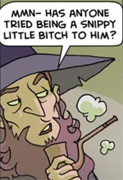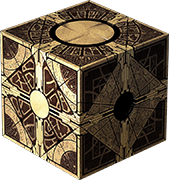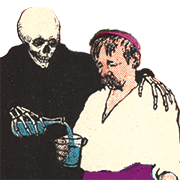|
Bucnasti posted:ProfDM's system is simultaneous action, he asks everyone what they're doing in order around the table, and then he adjudicates them all simultaneously. Which really isn't an initiative-less system, things still happen in some sort of order, it's just now on the GMs shoulders. He uses this system because it's fast at the table. It helps analysis paralysis because people don't have to re-analyze the table situation after each player takes an action. The games he runs are also fairly OSRy, so the possible actions of everyone at the table are pretty limited, it would be a nightmare to use this system with modern DnD, or something similarly complex. For it not to matter seems to me to just say that the combats basically have little tactical depth. Everyone is just chucking dice at the big bag of HP until it falls over or they do. Positioning? You need to know who gets to a place first for position to matter. Combos? You need to know who is setting up who. Meaningful status? You need to know what status you have to know what is even possible for you to do. Meaningful status can affect what choices you have. If you don't know your status when you make your choices, either the status will not matter or you'll just get your turns invalidated with save-or-suck miss your turn BS. Obviously not every combat system needs tactical depth, but then I have to wonder what you DO want out of it and how does this system give it to you? If it's narrative, why not just have the GM point at someone and ask them what they do like in a PbtA game? If it's quick-resolution with danger and resource expenditure, why have individual turns? Why not just have a single roll for the round like Trophy? (Or for the whole combat... but breaking it down by round lets there be some interesting iterative decisions about what resources to spend)
|
|
|
|

|
| # ? May 8, 2024 17:55 |
|
Maybe I'm not describing this thoroughly enough, by group initiative I don't mean everyone just shouts out what they're going to do. I have three players, at the beginning of an encounter they roll together against the NPCs, and the side with the highest total goes first. If there are more than one distinct group of NPCs (like say to opposed groups that the players have stumbled into the middle of) then each group makes its own roll. On their turn the three players discuss their plans, and then they take turns in the order that they choose, usually the bard and the warlock cast buffs debuffs and eldritch blast, and the warrior follows with her attacks to finish off any wounded foes. There's never a question of timing or interrupts because they each complete their full turn before somebody else takes a turn. Since the NPCs take no (non-reactive) actions in between player actions the state of the battlefield is very clear through the player turn. On the NPCs turn they take their actions in the order that I chose, usually closest to farthest from the PCs but occasionally it gets switched up based on what the NPCs are capable of. It's simple and fun and requires no initiative trackers or extra bookkeeping on my part. Alpha striking isn't an issue because it's DnD, which isn't very lethal to PCs, but even if I was playing a gritty higher lethality game I would probably still use this system because I would expect the players to be more careful about entering combat at all and when necessary being more diligent about ambushing/surprising opponents so they could guarantee first action.
|
|
|
|
Yeah, I was replying to the idea of the "everyone declares simultaneously and then the GM just decides what happens when" method, not to group initiative. Group initiative is honestly pretty similar to individual initiative in all the ways I consider most important. And even in individual initiative games, it's not terribly uncommon for all the PCs to end up in a clump together, effectively turning it into group initiative for the encounter.
|
|
|
|
Isn't this just side initiative, though? Sword World (my current raison d'etre) does this, although the players decide what order they act in, which sometimes has tactical consequences. (For instance, a sorcerer can go last to cast an area debuff, affect the enemies all through their phase, then go first next turn to cancel the spell before it affects the other players.)
|
|
|
|
Mirage posted:Isn't this just side initiative, though? Sword World (my current raison d'etre) does this, although the players decide what order they act in, which sometimes has tactical consequences. (For instance, a sorcerer can go last to cast an area debuff, affect the enemies all through their phase, then go first next turn to cancel the spell before it affects the other players.) Which once again to me sounds like it takes away interesting choices, this is just the Sorcerer making a no-expenditure decision to remove the drawback of their spell(the AoE may also affect party members), when previously there were benefits and costs to be considered.
|
|
|
|
PurpleXVI posted:Which once again to me sounds like it takes away interesting choices, this is just the Sorcerer making a no-expenditure decision to remove the drawback of their spell(the AoE may also affect party members), when previously there were benefits and costs to be considered. Yes in one way, no in another; most area buff/debuff spells last for several rounds, and they all cost MP to cast. So the Sorc is deliberately not getting the full bang from their MP buck so as not to affect their friends. Which just goes to show that it's sometimes a good idea to build a system holistically, with thought toward balancing all the parts, rather than going "hey this is a neat idea" and having that neat idea topple your game some other way.
|
|
|
|
Dungeon Meister posted:My idea for how to address some of this when using simultaneous action was to roll initiative as-needed for race conditions. For example, if a PC and an enemy melee attacked each other, and the PC did enough damage to kill the enemy, then I'd ask for an initiative roll to determine if the fatal blow was struck before the enemy had a chance to land theirs. An even more efficient system someone pointed out to me is that you can use the attack rolls for initiative. I.e., if two people attack each other, the one with the higher total roll strikes first (if that matters). It doesn't work for actions that don't use rolls but where timing could still matter, like spells, but it's still cool. Jimbozig posted:I'm thinking of my most recent games and the encounters we've played and the initiative order is incredibly important. Occasionally it doesn't matter so much, if two players are on very different parts of the map then they could kind of go at the same time and not affect each other, but that's the exception. It does seem to made to emphasize narrative or verisimilitude over tactics, but I wouldn't say it makes them irrelevant. You can still have combos just by declaring your characters are doing the combo, if it's something like one fighter assisting another with his attack, or by making an initiative check if it's something that needs to get off in time like a cleric blessing the party (or just assuming it happens with a friendly DM if the cleric isn't being threatened). There's also, of course, nothing to stop a combo from spanning multiple rounds, where your party members simply get the benefit in the next round rather than the current one. For the other cases you mention, I'd say to just make initiative checks as-needed, because in my experience it's the exception rather than the rule. You certainly might be imposing a condition on your opponent that gives them disadvantage to attack you, but not all conditions do (immobilizing a character that wasn't going to move this turn, for example) and that doesn't happen more often than it does happen. As for your other questions, I'm not sure I understand what you mean by "individual turns" and "a single roll for the round," since I've never played Trophy.
|
|
|
|
Bobby Deluxe posted:1d12 plus bonuses. It goes along with another streamlining idea of the system (which might not going to be as popular but here goes).
|
|
|
|
Dungeon Meister posted:As for your other questions, I'm not sure I understand what you mean by "individual turns" and "a single roll for the round," since I've never played Trophy. No turns, just rolling until either you win or everyone feels the risk is too great (or the risks destroy you). JMBosch fucked around with this message at 19:01 on Jun 11, 2023 |
|
|
|
I like the idea of big super combo attacks requiring some sort of synchronisation test between participants and/or requiring one participant to go before the other in a turn. So, for theoretical example, you can only do the Blessed Axe Chop super combo if the priest has their action before the barbarian in the initiative list on the same turn. If they don't, the priest will either have to hold until next turn and change their position on the initiative list, Pathfinder style, or settle for the Cleave 'n' Smite combo where the barbarian goes first.
|
|
|
|
Splicer posted:I have multi-paragraph rants in this subforum about how passive always-on bonuses destroy games. If you'd told me you were ditching them entirely I would applaud. Having not seen those rants I would be interested in the short version.
|
|
|
|
Me as well. I know why I hate stacking bonuses - dyscalculia - but I'm always interested in hearing others reasoning.
|
|
|
|
PurpleXVI posted:Having not seen those rants I would be interested in the short version. Optional, always* on bonuses skew this balance. If a trip is balanced against giving up a 10 damage attack then your attacks doing 12 damage reduces the relative value of a trip. If these are built in bonuses that come from leveling your character archetype that's fine, because since that's predictable you've presumably balanced your game including trip vs attack with these increases in mind. But if the +2 damage was something you chose from a list that included options that aren't a passive, always-on boost to attacks then there's no predictable metric to balance the worth of an action around. Balancing around 10 damage means that the 12 damage guy is now disincentivised to attempt anything other than attacking, but balancing around 12 damage means anyone not taking the "optional" attack boosts are falling behind the expected damage curve. That's not what breaks games though. What breaks games is these incentives compound. If you've invested resources into doing action A then not doing action A as much as possible is "wasting" the resources you spent. If you're later given an opportunity to boost the same action or something else then obviously you'll boost the one you're already trying to do as much as often. And the next time and the next time and the next time. So do you balance the game around the hyperspecialised one-trick pony guy who's just doing what your game encouraged him to do or around the guy who didn't do that because they wanted to make a fun well rounded character? What if they're in the same party? This applies to more complex systems too. e.g. if you take Headsman's Chop in 4E you get a +5 to prone targets with an axe or heavy blade, so if you take that feat any subsequent power you take that does NOT either prone people or also gain powers from proning people is "wasting" uses of Headman's chop. It also applies to time-based spells (hence the two *'s above)- if you have an hour of flaming sword then every round not spent attacking is a waste of flaming sword "charges". The only way around it is no opt-in passive bonuses. Casting flame tongue on a sword gets you a discrete power or X uses of +1d6 fire damage. A permanently enchanted magic sword does the same amount of damage as a non-fire sword of the same level, and you also can't add player-facing ways to add fire vulnerability or +X damage to all fire attacks.
|
|
|
|
I would agree with this analysis to an extent, in many cases yes, passive bonuses will drive towards hyperspecialization and just doing one thing over and over.
|
|
|
|
I'm working on a magic system for an old-school-style game. So the low-level spells aren't generally meant to be damaging or have much combat utility, but can be helpful if used creatively. I'm also trying to make a system where players choose two symbols from six representing schools, and that determines their starting magical abilities. One for each school, plus one that arises from having both. I'd like ideas for what I could fill the missing or uncertain slots with. Or different names for the schools, if you can think of something better. 💀Necromancy: Deals with death, decay, and control of life force. Gives you extra knowledge about recognizable remains, such as how they died or who they were. + Pathomancy: Grief. Another creature feels disabling sadness. + Pyromancy: Life drain. Transfer life from one creature touched to another at 2:1 rate per round. + Nyxomancy: Create poisons. + Optomancy: Detect nearby undead and recently deceased. + Manumancy: Decay with touch. Works more quickly on objects than creatures due to life force getting in the way. ❤️Pathomancy: Deals with feelings and interpersonal relationships. You can make minor and temporary alterations to how someone feels. + Necromancy: Grief. Another creature feels disabling sadness. + Pyromancy: Enrage a creature. + Nyxomancy: Create illusion. + Optomancy: Detect feelings. Strong emotions can be detected through doors or walls. + Manumancy: Charm person with touch. 🔥Pyromancy: Deals with energy, passion, destruction, and of course literal fire. Instantly combust tinder, oil, etc. Burn any flammable material with time. Strengthen existing flames. + Necoromancy: Life drain. Transfer life from one creature touched to another (caster can be source or destination) at 2:1 rate per round. + Pathomancy: Enrage a creature. + Nyxomancy: ? + Optomancy: ? + Manumancy: Brief, powerful burst of force like magic missile? 🌙Nyxomancy: Deals with secrets and deception. Can make a single inanimate object smaller than a person invisible. + Necromancy: Create poisons. + Pathomancy: Create illusion. + Pyromancy: ? + Optomancy: Give someone darkvision for an hour a day. + Manumancy: Once a day, someone can perform actions in perfect silence? 👁️Optomancy: Deals with the senses and awareness. Each day, choose a sense. For the rest of that day, that sense can be enhanced beyond human levels by focusing. + Necromancy: Detect nearby undead and recently deceased. + Pathomancy: Detect feelings. Strong emotions can be detected through doors or walls. + Pyromancy: ? + Nyxomancy: Give someone darkvision for an hour a day. + Manumancy: Mage hand has sense of touch, giving short-range sonar. ✋Manumancy: Deals with force and physical manipulation. 5 pounds telekinesis at 10 foot distance without minute control. + Necromancy: Decay with touch. Works more quickly on objects than creatures due to life force getting in the way. + Pathomancy: Charm person with touch + Pyromancy: Brief, powerful burst of force like magic missile? + Nyxomancy: Once a day, someone you choose can perform actions in perfect silence? + Optomancy: Mage hand has sense of touch, giving short-rage sonar. Dungeon Meister fucked around with this message at 19:12 on Jun 13, 2023 |
|
|
|
Dungeon Meister posted:I'm working on a magic system for an old-school-style game. So the low-level spells aren't generally meant to be damaging or have much combat utility, but can be helpful if used creatively. I'm also trying to make a system where players choose two symbols from six representing schools, and that determines their starting magical abilities. One for each school, plus one that arises from having both. I'd like ideas for what I could fill the missing or uncertain slots with. Or different names for the schools, if you can think of something better. For necromancy and manumancy, what about something like rotting or breaking something you're touching? Like getting out of rope bindings or weakening a wooden door so it can be knocked down or off its hinges
|
|
|
|
Dungeon Meister posted:I'm working on a magic system for an old-school-style game. So the low-level spells aren't generally meant to be damaging or have much combat utility, but can be helpful if used creatively. I'm also trying to make a system where players choose two symbols from six representing schools, and that determines their starting magical abilities. One for each school, plus one that arises from having both. I'd like ideas for what I could fill the missing or uncertain slots with. Or different names for the schools, if you can think of something better. Manumancy is a shape matter deal, pyromancy is energy manipulation, man+pyr lets you shape and manipulate at range (so proper telekinesis) while pyr+man lets you create shaped energy constructs. Maybe lean into that kind of thing for the other two E: I assume there's like a major/minor relationship? Otherwise you've doubled up all your combos Splicer fucked around with this message at 16:57 on Jun 13, 2023 |
|
|
|
Napoleon Nelson posted:For necromancy and manumancy, what about something like rotting or breaking something you're touching? Like getting out of rope bindings or weakening a wooden door so it can be knocked down or off its hinges That's a great idea, thanks. Splicer posted:Optomancy and nyxomancy have a lot of thematic overlap, as do pyromancy and manumancy. Honestly I'd lean into that, making them not-so-different opposites. Finer or stronger telekinesis was just going to come with higher levels of manumancy. Just like proper character invisibility comes with higher nyxomancy, etc. But I like the idea of pyromancy + manumancy adding an energetic quality to long-range force manipulation. Maybe that could be where something like magic missile lives. Splicer posted:E: I assume there's like a major/minor relationship? Otherwise you've doubled up all your combos The combos are just written that way for easier reference, so you can look it up from either school. It doesn't actually matter which school is taken first or second.
|
|
|
|
Stuff I just thought of: Optomancy + Pyromancy should be light creation. You can create a dim light out of nothing, or you can make an existing source of light powerfully (and painfully) bright. Probably with limits because that could be so useful in a dungeon crawl. Manumancy + Nyxomancy shouldn't just be about making your own actions silent and giving you a stealth bonus, it should be the ability tom make anything you interact with silent. Like if you break down a door. Obviously needs a daily limit also.
|
|
|
|
LeisureSuit Canary posted:Haven't seen this posted anywhere around here. How is this going for you? I am trying to put something together for it; there's only about ten days before it ends and I haven't even begun gathering art or prepping layout so I'm wondering if I should even bother trying to complete. I'd like to hear some opinions on the rough idea. It's more of a Cataan-style board game than an RPG so I don't even know if it's a good fit for the jam. Your 3-6 players are on a space station orbiting the moon. It's a brand-new station with a "2001"/NASA aesthetic, i.e. sterile and boring and monochrome. Your task as players is to redecorate it in your favorite style (Firefly, Star Trek, Alien, etc.) by gathering six pieces of Decor for that style. Every turn, a visitor comes to the station to barter, and players can gain Decor that way--but not necessarily the Decor you need. Each player has a position on the crew which gives them a unique skill to use. You use a currency called Components to barter, build, or pay for skills. Each turn consists of three phases: Phase 1- Use a skill to either help yourself or hinder an opponent. Some skills available to everyone include building Decor, getting a bonus in Phase 2, or breaking Decor you don't need for components. Some of the unique skills involve preventing another player from using their skill, stealing Decor from another player, or influencing what you get from the visitor that shows up that turn. Phase 2 - A random visitor arrives. Each player rolls to get Components or Decor (unless they are prevented by a skill use). Phase 3 - The players may trade with one another. They can trade with Components, Decor, or promises to use skills for each other's benefit. Play continues until at least one player has all six pieces of Decor and can decorate the station as they please. I don't know if this even sounds fun. I want it to have a humorous tone but that's mostly going to come through in the writing, not the actual gameplay, so I know that's barely going to be noticed by most of the people who play the game (and realistically that's only going to be, what, 50 people tops). I guess I'm asking what I should have asked a month ago: Does this even sound interesting? Am I retreading ground other games do better?
|
|
|
|

|
| # ? May 8, 2024 17:55 |
|
Everything Counts posted:How is this going for you?
|
|
|















